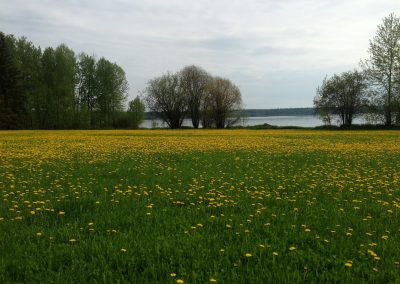When the Germans Came to Fawcett Lake
Joe McWilliams
Lakeside Leader
He liked to skate, or at least the idea of skating. He was a blacksmith by trade and briefly a member of a submarine crew. Now he spent his days hacking limbs from fallen spruce trees with a broad-axe and occasionally doing blacksmith work in the company shop. Somehow he managed to find or fashion a pair of skates. Maybe he used his skills to craft a couple of blades he could attach to his boots. Thus equipped, he went out onto the frozen lake in the moonlight.
It wasn’t allowed, of course. Much was not allowed. He was to stay away from the civilian employees, and couldn’t go for walks in the bush. Hunting and trapping were forbidden. He was allowed to go out to work, come back and stay in barracks and not much else. He was, after all, a German prisoner of war.
But like most of his 50-odd companions, he did many things that were not on the permitted list and contemplated doing others. Tonight, he would try skating.
The lake was bare and smooth, the ice at least six inches thick. A combination of early frost and no snow had created the perfect skating rink. He had been noticing it and preparing it for several days. Tonight was the night.
He strapped on his blacksmith shop blades and pushed off with his right skate, gliding on his left. He continued, pushiing and gliding in large circles, enjoying the sensation.
The moonlight reflected in the lake’s dark surface and the stars twinkled brilliantly in the black sky. The kerosine lantern glow leaking out of the camp buildings was insignificant, and partly hidden by shoreline brush. Far off beyond the shoreline a coyote called, and was soon answered by another and then another in an eerie high-pitched wail. It gave him the creeps. He had read stories in his boyhood about life in the American wilderness. And now here I am, he thought – wild animals and forest all around and me alone in the middle of it.
But not quite alone. Suddenly he was aware of someone watching him.
At first glance there’s not much to get exited about at the west end of Fawcett Lake. There’s an undeveloped government campground and lots of bush of the usual kind. Once you start poking around though, there’s plenty of evidence of the human acitvity in former times.
Suckering aspen and poplar trees push up through and around piles of rotting timbers. Spruce trees too, of 40 to 50- year vintage stand over scattered remnants of macinery and equipment. Rusted chains, cables, bars, wheels, sprockets, pipes and panels litter the leaf mould – sometimes on it and sometimes buried by it.
The POWs were crew members of two German submarines, both captured early in the war. U-39 was in fact the first German submarine casualty in the war, according to John Masters of the HMS Firedrake Association. In his book on the history of the Firedrake, Masters devotes a chapter to the story of the sinking of the U-39. The battle took place in September of 1939 in the Atlantic Ocean northwest of Scotland.
“On the 14th September (1939) at 1512 hrs. off the Rockall Bank, U-39 fired two torpedoes at the Ark Royal (a British carrier accompanied by six destroyers). Both exploded before hitting their mark. “(HMS) Foxhound went straight into the attack followed by the Faulknor and then the Firedrake. All three destroyers dropped a pattern of depth charges over the same area. Firedrake was the last to lay her pattern.”
“Minutes later the U-boat came slowly to the surface. Foxhound was nearest to U-39 as she surfaced, and was about to ram her but men were seen jumping into the sea from the conning tower so the rescue started. The Foxhound picked up 25 of the boat crew.”
It was an unlucky day for the submarine, but very lucky for her crew. Not a single man died in the sinking. All 43 were rescued and taken prisoner. Not one of them had to face another depth charge for the rest of the war. Nor did the crew of U-27, which was sunk in similar fashion six days later in the same waters. All 38 of her crew were rescued by the British ships that sunk her. It is estimated that 80% of the men in Germany’s U-boat navy did not survive the war.
All of the U-39 crew and part of the U-27 crew ended up deep in the wilderness of northwestern Canada in late 1943. There they served out the war cutting down trees 10 hours a day, six days a week while death and destruction raged over Europe and Asia.








